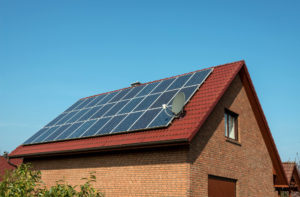With the increasing focus on clean energy and sustainability, many homeowners are considering solar power as a viable option to power their homes. This comprehensive guide will walk you through going solar at home, covering everything from assessing your solar potential to choosing the right solar panels and financing options. Let’s explore the steps to embark on your solar journey and enjoy the benefits of renewable energy.
Contents
- 1 Key Takeaways
- 2 Assessing Your Home’s Solar Potential
- 3 Financial Considerations and Incentives
- 4 Choosing the Right Solar Installer
- 5 Shopping for Solar Panels
- 6 Solar Battery Systems
- 7 Going Solar with Community Solar
- 8 Case Study: Embarking on a Solar Journey with Solar Panels Network USA
- 9 Expert Insights From Our Solar Panel Installers About Going Solar at Home
- 10 Experience Solar Excellence with Us!
- 11 Conclusion
Key Takeaways
- Assess your home’s solar potential by evaluating energy use, understanding solar panels, and considering roof orientation and shading factors.
- Consider financial incentives and financing options, such as tax credits and solar loans, to make the transition to solar more affordable.
- Choose a reputable solar installer, weigh the pros and cons of DIY vs. professional installation, and carefully select high-quality solar panels and battery systems to maximize energy production and storage.
Assessing Your Home’s Solar Potential
Assessing your home’s solar potential is a critical initial step in determining the feasibility and benefits of a solar installation tailored to your specific needs. By thoroughly evaluating various factors, you can gain a deeper understanding of your property’s solar potential.
Evaluating Energy Use and Needs
To accurately assess your energy use and needs, analyze your electricity bills to understand your consumption patterns. Consider peak usage months and any anticipated future energy usage changes. This analysis will help determine the optimal size of the solar system required to meet your energy demands effectively.
Understanding Solar Panels and How They Work
Understanding the functionality and characteristics of solar panels is crucial for choosing the right system. Learn about the different types of solar panels available, such as monocrystalline, polycrystalline, and thin-film, to understand their energy conversion efficiencies, durability, aesthetics, and suitability for your specific requirements. Consider factors like efficiency, temperature coefficient, and degradation rate to make an informed decision.
Financial Considerations and Incentives
Assessing the financial aspects of going solar is essential for understanding the long-term benefits and return on investment. Additionally, exploring available incentives and financing options can make the transition to solar power more affordable and financially viable.
Estimating the Cost of Solar Panels
The cost of solar panels can vary based on factors such as system size, panel quality, installation complexity, and regional variations—request quotes from reputable solar companies to obtain a realistic estimation of costs. Consider the long-term savings on your electricity bill and potential returns on investment when evaluating the affordability of solar panels.
Exploring Solar Financing Options
Various financing options make solar installations accessible to homeowners. Solar loans, leases, and power purchase agreements (PPAs) offer alternative payment structures. Research these options and compare interest rates, terms, and conditions to determine the most suitable financing solution for your circumstances. Evaluate the impact on your monthly cash flow and consider the long-term savings generated by your solar system.
Solar Incentives and Tax Credits
Government incentives and tax credits significantly reduce the upfront cost of installing solar panels. For example, the federal investment tax credit (ITC) allows homeowners to deduct a percentage of their solar system costs from their federal taxes. Additionally, local and state programs may offer rebates, grants, or performance-based incentives. Research available incentives in your area and consult with professionals to ensure you take full advantage of these opportunities.

Choosing the Right Solar Installer
Selecting the right solar installer is crucial for a successful solar installation that meets your expectations and maximizes energy production. A reputable installer brings expertise, experience, and industry knowledge to ensure a seamless transition to solar power.
Understanding the Role of a Solar Installer
A solar installer plays a vital role in your solar system’s design, installation, and maintenance. They are responsible for system engineering, obtaining permits, and adhering to local regulations. Additionally, they ensure solar panels’ optimal positioning and connection for maximum energy production and system efficiency.
Researching and Selecting a Solar Installer
When selecting a solar installer, research local companies and check their credentials, certifications, and customer reviews. Seek recommendations from friends, neighbors, or online platforms. Request detailed quotes from multiple installers and evaluate their proposals, warranties, installation timelines, and customer service. Choose an installer with a proven track record of successful residential solar installations and a commitment to customer satisfaction.
DIY Solar vs. Professional Installation
While some homeowners may consider a do-it-yourself (DIY) approach to solar installation, it is essential to weigh the benefits and challenges of this option.
Assessing the Feasibility of DIY Solar
Assessing the feasibility of DIY solar involves evaluating your technical skills, time availability, and comfort level with handling complex installations. DIY solar can offer cost savings but requires a solid understanding of electrical systems, structural considerations, and compliance with local building codes. Consider the complexity of your project, the size of the system you intend to install, and the resources available to you.
Benefits of Professional Solar Installation
Opting for professional solar installation offers several advantages that can outweigh the potential challenges of DIY solar. Certified installers bring expertise, experience, and industry knowledge to ensure a smooth and efficient installation.
- Safety and Compliance: Professional installers are well-versed in safety protocols, electrical codes, and structural considerations. They ensure that your solar system is installed safely, minimizing the risk of accidents and ensuring compliance with local regulations.
- System Optimization: Experienced installers understand solar system design and placement intricacies. They evaluate roof orientation, shading, and panel positioning to maximize energy production and system efficiency.
- Long-Term Performance: Professional installation helps ensure your solar system’s long-term performance and reliability. Installers use high-quality materials, perform proper wiring and connections, and conduct thorough testing to ensure optimal functionality.
- Warranty and Support: Reputable installers provide comprehensive warranties on solar panels and installation workmanship. In case of any issues or malfunctions, professional installers offer dedicated customer support and service, giving you peace of mind.
Shopping for Solar Panels
Choosing the right solar panels is a crucial decision that can impact the performance and longevity of your solar system. Consider the following factors when shopping for solar panels:
Researching Solar Panel Options
Thoroughly research and compare different solar panel options available in the market. Look for reputable brands and manufacturers known for their quality and reliability. Consider factors such as efficiency ratings, temperature coefficients, product warranties, and product certifications. Look for panels that align with your energy production goals and offer high performance in various weather conditions.
Evaluating Solar Panel Warranties and Durability
Solar panel warranties provide assurance and protection for your investment. Consider both product warranties and performance guarantees offered by the manufacturers. Ensure that the warranty covers defects and power output degradation over time. Additionally, evaluate the durability and resistance of the panels to factors like weather conditions, impact resistance, and corrosion.
Assessing Efficiency and Performance
Efficiency is a key factor in determining the energy output of your solar panels. Higher efficiency panels convert more sunlight into electricity, allowing you to generate more power from a given surface area. However, higher-efficiency panels may come at a higher cost. Consider your available roof space, budget, and energy goals when deciding the optimal balance between panel efficiency and cost-effectiveness.
Compatibility with Your Solar System
Ensure that your solar panels are compatible with your specific solar system. Consider factors such as voltage ratings, wiring configurations, and compatibility with your chosen inverter. Consult with your solar installer or a professional to ensure proper integration and optimal performance of your solar panels within your overall system.

Solar Battery Systems
Solar battery systems provide a means to store excess solar energy for later use, enhancing the self-sufficiency and resilience of your solar system.
Understanding the Role of Solar Batteries
Solar batteries store the excess electricity generated by your solar panels during periods of high production. This stored energy can then be used when your panels are not generating enough power, such as during nighttime or cloudy days. Solar batteries allow you to become less reliant on the grid and maximize the utilization of your solar-generated electricity.
Exploring Different Solar Battery Options
When selecting a solar battery system, consider factors such as capacity, depth of discharge, efficiency, and cycle life. Lithium-ion batteries are widely used in solar systems due to their high efficiency, longer cycle life, and ability to handle deep discharge cycles. They offer faster charging times, longer lifespans, and better energy storage capacity than traditional lead-acid batteries. However, lead-acid batteries are more affordable and may be suitable for smaller-scale or off-grid solar installations.
Consider your energy storage needs, available space, and budget when choosing a solar battery system. Evaluate the battery’s capacity to store energy during peak production periods and its ability to provide a consistent power supply during low solar generation periods. It’s also essential to consider the battery’s warranty, maintenance requirements, and compatibility with your solar inverter and overall system.
Going Solar with Community Solar
Community solar programs provide an alternative pathway to access the benefits of solar power, even if you cannot install solar panels on your property. By participating in a community solar project, you can still benefit from clean and renewable energy while supporting the development of large-scale solar installations.
Understanding Community Solar Programs
Community solar programs involve shared solar arrays installed in a centralized location, such as a solar farm or a large rooftop installation. Participants can subscribe to a portion of the solar energy generated by the project and receive credits or savings on their electricity bills. This option is particularly beneficial for individuals who live in apartments, have shaded roofs, or face other constraints preventing them from installing solar panels.
Participation and Subscription Options
Research community solar programs available in your area and understand the participation and subscription options they offer. Determine the percentage of solar energy allocated to each participant and the financial terms associated with participation. Evaluate the duration of the subscription, any cancellation fees, and the projected savings on your electricity bills. Compare different community solar projects to find the one that aligns with your values, financial goals, and desired level of involvement.
Case Study: Embarking on a Solar Journey with Solar Panels Network USA
Background
At Solar Panels Network USA, we are dedicated to helping homeowners transition to clean and renewable energy solutions. This case study highlights our approach to guiding homeowners through the process of going solar, ensuring a smooth and successful transition to solar power.
Project Overview
The project involved assisting a suburban family in assessing their home’s solar potential, navigating financial considerations, choosing the right solar installer, and selecting high-quality solar panels. The goal was to provide a comprehensive solution that maximizes energy savings and promotes sustainability.
Implementation
Assessing Solar Potential
Energy Use Analysis
We began by analyzing the family’s electricity bills to understand their energy consumption patterns. This analysis included identifying peak usage months and anticipating future changes in energy needs. By evaluating their energy use, we determined the optimal size of the solar system required to meet their demands.
Roof Orientation and Shading
Next, we assessed the roof’s orientation and shading factors. The south-facing roof provided excellent solar exposure, while minimal shading from nearby trees ensured maximum sunlight absorption. These factors were crucial in designing an efficient solar system tailored to their property.
Financial Considerations and Incentives
Estimating Costs and Exploring Financing Options
We provided detailed cost estimates for the solar panels and installation. Additionally, we explored various financing options, including solar loans and leases, to make the transition more affordable. By comparing interest rates, terms, and conditions, the family chose a financing solution that aligned with their financial goals.
Leveraging Incentives and Tax Credits
We guided the family through available government incentives and tax credits, such as the federal investment tax credit (ITC). These incentives significantly reduced the upfront cost of the solar installation, making it a financially viable option for the family.
Choosing the Right Solar Installer
Research and Selection
The family chose Solar Panels Network USA as their trusted solar installer. Our extensive experience, industry certifications, and positive customer reviews made us the ideal partner for their solar journey. We provided a detailed proposal, transparent pricing, and a clear installation timeline.
Professional Installation
Our professional installation team ensured compliance with local regulations, safety protocols, and optimal system performance. We maximized energy production by carefully positioning the solar panels, considering the roof’s orientation and shading factors. The family was impressed with the smooth and efficient installation process.
Results
Energy Cost Savings
The family experienced significant reductions in their electricity bills immediately after the solar system was operational. The solar panels generated enough electricity to cover a substantial portion of their energy needs, resulting in long-term cost savings.
Environmental Impact
By transitioning to solar power, the family reduced their carbon footprint and contributed to environmental sustainability. The clean energy produced by their solar panels helped decrease greenhouse gas emissions, promoting a greener future.
Enhanced Home Value
The solar installation increased the value of their home. Potential buyers are increasingly interested in properties with renewable energy solutions, making the home more attractive in the real estate market.
Summary
This case study demonstrates how Solar Panels Network USA guided a suburban family through every step of their solar journey, from assessing their home’s solar potential to selecting the right installer and financing options. By leveraging available incentives and choosing high-quality solar panels, the family achieved significant energy cost savings and reduced their environmental impact.
Going solar at home is a rewarding investment that offers long-term financial and environmental benefits. With expert guidance, thorough planning, and professional installation, homeowners can successfully transition to renewable energy and enjoy the advantages of clean, sustainable power. At Solar Panels Network USA, we are committed to helping families harness the power of the sun and make a positive impact on the planet.
Expert Insights From Our Solar Panel Installers About Going Solar at Home
One of the first steps in going solar is assessing your home’s energy use and needs. Understanding your electricity consumption patterns can help determine the optimal size of your solar system, ensuring it meets your energy demands effectively.
Lead Solar Engineer
Choosing the right solar panels involves considering factors such as efficiency, durability, and warranties. It’s important to invest in high-quality panels that offer long-term reliability and performance to maximize your energy savings.
Senior Solar Installer
Professional installation ensures safety, compliance with local regulations, and optimal system performance. Certified installers bring expertise that DIY projects might lack, providing peace of mind and long-term benefits for your solar investment.
Solar Installation Expert
Experience Solar Excellence with Us!
Trust in Solar Panels Network USA, where our seasoned experts deliver top-quality solar solutions for homes and businesses nationwide. With a legacy of countless successful installations and a commitment to sustainable energy, we’re your reliable partner in the solar journey. Ready for a brighter, eco-friendly future? Call us now at (855) 427-0058 and harness the power of the sun!
Conclusion
Going solar at home is an excellent step towards embracing clean energy and reducing dependence on traditional power sources. Assessing your home’s solar potential, understanding the financial aspects, choosing the right installer, and selecting high-quality solar panels are key factors in ensuring a successful solar installation. Consider the feasibility of DIY solar and the benefits of professional installation based on your skills and preferences. Explore solar battery systems and community solar options to maximize energy savings and participate in shared renewable energy projects.
Going solar can reduce your carbon footprint, lower energy costs, and contribute to a more sustainable future. Embrace the sun’s power and make a positive impact by transitioning to residential solar power. With careful planning, thorough research, and expert guidance, you can embark on a solar journey that brings clean and renewable energy to your home.
About the Author
Solar Panels Network USA stands at the forefront of solar energy solutions, driven by a team of seasoned solar engineers and energy consultants. With over decades of experience in delivering high-quality solar installations and maintenance, we are committed to promoting sustainable energy through customer-centric, tailored solutions. Our articles reflect this commitment, crafted collaboratively by experts to provide accurate, up-to-date insights into solar technology, ensuring our readers are well-informed and empowered in their solar energy decisions.

